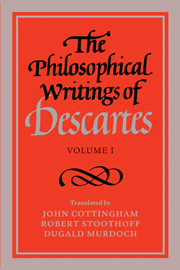Book contents
- Frontmatter
- Contents
- General introduction
- Chronological table of Descartes' life and works
- Early Writings
- Rules for the Direction of the Mind
- The World and Treatise on Man
- Discourse and Essays
- Principles of Philosophy
- Comments on a Certain Broadsheet
- Description of the Human Body
- The Passions of the Soul
- Index
Early Writings
Published online by Cambridge University Press: 05 June 2012
- Frontmatter
- Contents
- General introduction
- Chronological table of Descartes' life and works
- Early Writings
- Rules for the Direction of the Mind
- The World and Treatise on Man
- Discourse and Essays
- Principles of Philosophy
- Comments on a Certain Broadsheet
- Description of the Human Body
- The Passions of the Soul
- Index
Summary
Translator's preface
An inventory of Descartes' papers made at Stockholm after his death mentions a small notebook containing various early writings, apparently composed during Descartes' travels in Europe during the years 1619–22. The notebook is now lost, but a copy taken by Leibniz was later discovered and published under the title Cogitationes Privatae (‘Private thoughts’) in 1859. This Latin text, as published with minor corrections in Volume x of Adam and Tannery, is the source of the extracts translated below.
According to Descartes' biographer Adrien Baillet (1649–1706), the original notebook (which he inspected) was divided into various sections under different headings. These included Praeambula (‘Preliminaries’) with the motto ‘The fear of the Lord is the beginning of wisdom’; Experimenta (‘Observations’); and Olympica (‘Olympian matters’). The probable positionings of these headings are indicated below, though the correct grouping and ordering of the extracts is a matter of conjecture, since no divisions or headings were provided in Leibniz' copy. A detailed study of the Early Writings may be found in Henri Gouhier, Les Premières Pensées de Descartes (Paris: Vrin, 1958).
J.C.
EARLY WRITINGS
Preliminaries
Actors, taught not to let any embarrassment show on their faces, put on a mask. I will do the same. So far, I have been a spectator in this theatre which is the world, but I am now about to mount the stage, and I come forward masked.
- Type
- Chapter
- Information
- The Philosophical Writings of Descartes , pp. 1 - 6Publisher: Cambridge University PressPrint publication year: 1985
- 39
- Cited by



